- You are in:
- Home >
- Publications >
- eJournal USA
eJournal USA
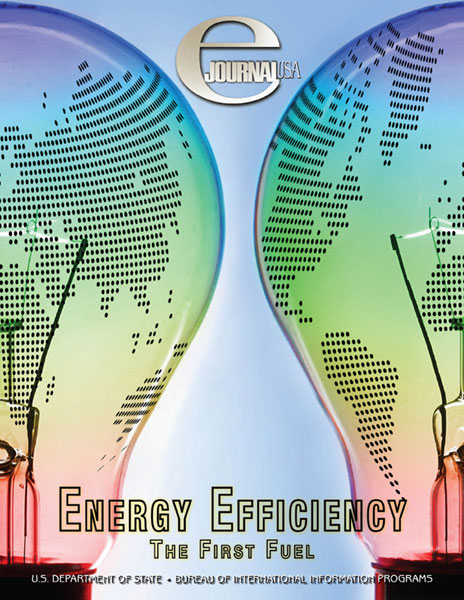
Energy Efficiency: The First Fuel
Increasing the efficient use of existing energy supplies is widely acknowledged as the fastest, cheapest, and cleanest way to meet future energy needs. Energy Efficiency: The First Fuel examines the strong U.S. record of tapping efficiency as a resource, and the accelerated efforts by individuals, organizations, and governments to squeeze greater productivity from all energy sources.
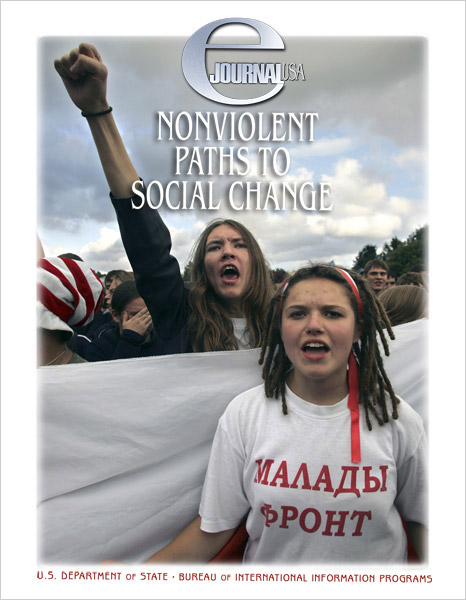
Nonviolent Paths to Social Change
The past 30 years have seen a surge of nonviolent, “people power” movements around the world advancing human rights and toppling repressive rulers. This edition of eJournal USA demonstrates that nonviolent actions can be more powerful than armed insurrections in bringing about social change.
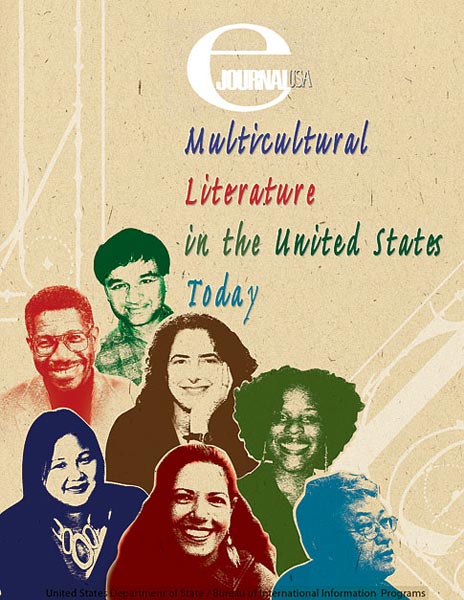
Multicultural Literature in the United States Today
The United States is enriched culturally by immigrants from many nations. This edition of eJournal USA focuses on distinguished American writers from various ethnic backgrounds who add immeasurably to mutual understanding and appreciation through tales of their native lands and their experiences as Americans.
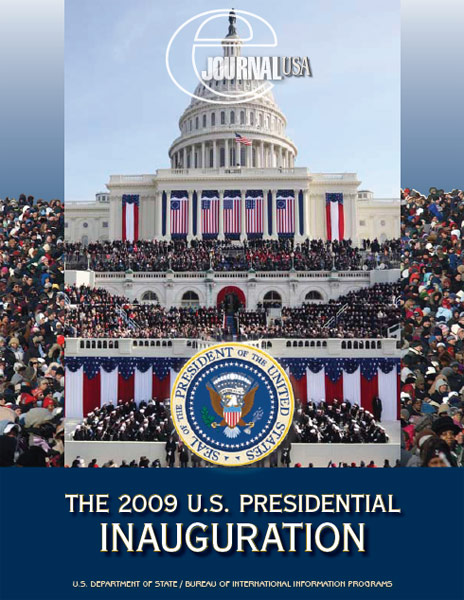
The 2009 U.S. Presidential Inauguration
The citizens of the United States enthusiastically celebrated the inauguration of their 44th president in January 2009. The peaceful transfer of power always renews faith in the strength of democracy, but in 2009 the rise of an African-American to the nation’s highest office also gave reason for pride at the nation’s repudiation of the segregation and slavery in its past. President Barack Obama called it a day when Americans chose “hope over fear.”
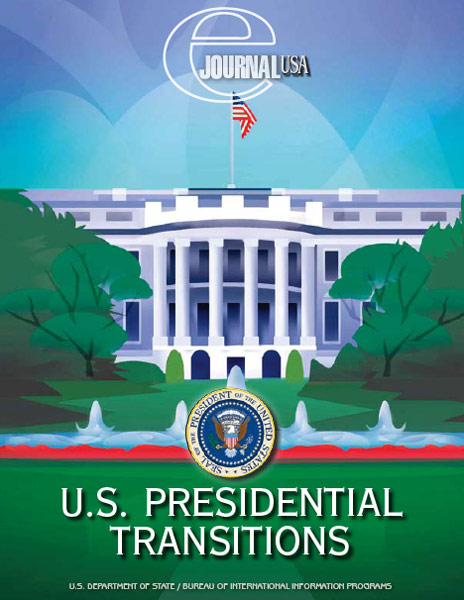
U.S. Presidential Transitions
We often read or hear about turmoil before, during, or after elections around the world. An important characteristic of democracy in the United States, however, is the regularly recurring peaceful transfer of power from one president to the next. Americans know when the next presidential election will take place – the Tuesday after the first Monday in November every four years. And power will be transferred to the newly elected (or re-elected) president on January 20 of the following year.
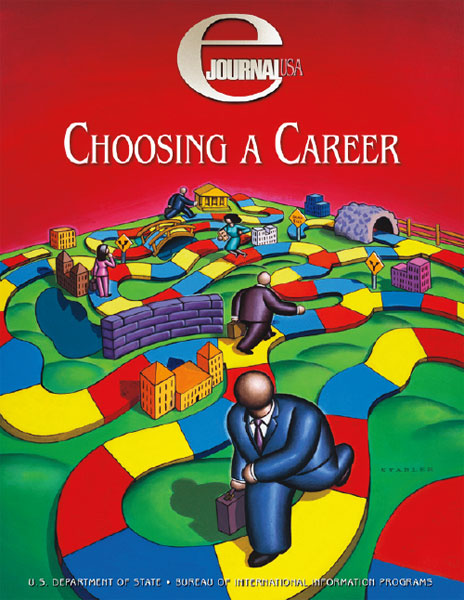
Choosing a Career
This edition of eJournal USA rambles down the many varied paths that Americans take on their way to find their life's work. Professionals in various fields explain how they got there, and some wrong turns they made along the way. Experts describe how young people can weigh and explore the options before them.
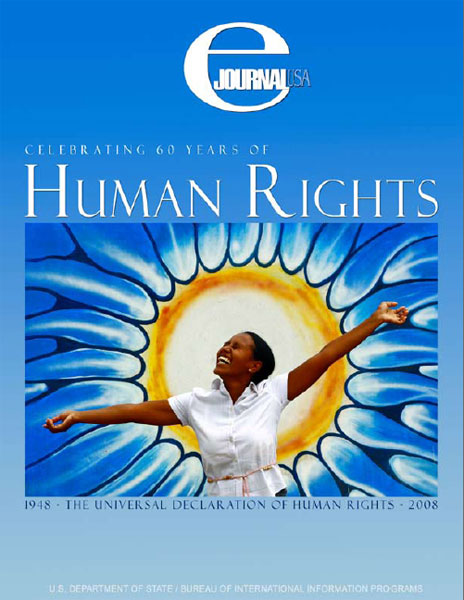
Sixty Years: Celebrating the Universal Declaration of Human Rights
This issue of eJournal USA celebrates the 60th anniversary of the Universal Declaration of Human Rights. It explores the document’s origins, sites it within humanity’s common intellectual heritage, and explains how it has bettered the lives of individuals in every corner of the globe.
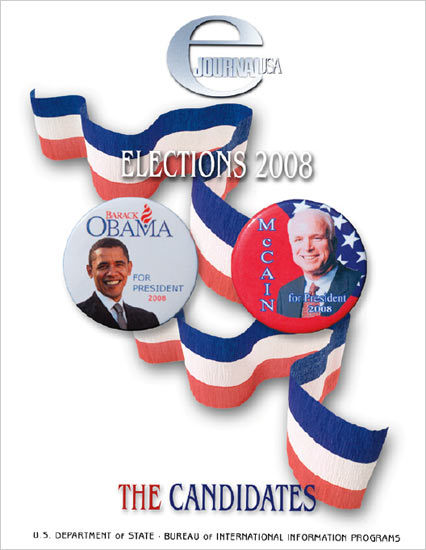
The Candidates
Every presidential campaign is dramatic and historic, but as the fervor surrounding the 2008 election continues to build, U.S. voters and the rest of the world will want to consider the candidates’ personal histories more closely. What sort of people rise to the top in the U.S. political system, what are their attributes, their sensibilities, and their strengths?
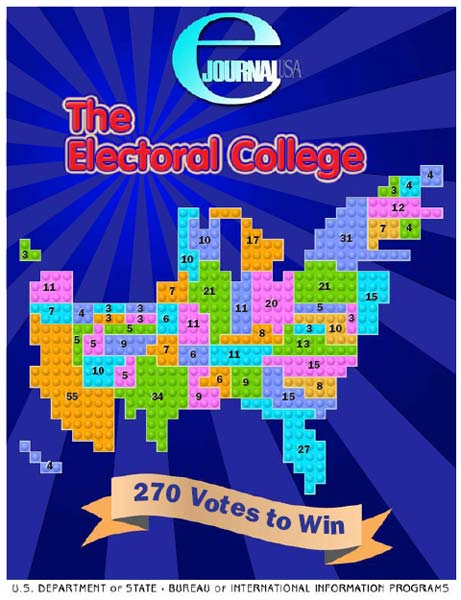
The Electoral College
More than 100 million voters are likely to cast ballots in nationwide U.S. elections November 4. But only 538 men and women will elect the next president of the United States, and those elections will take place in 50 state capitals and in Washington, D.C., December 15. This indirect election system, called the Electoral College and devised in 1787 by the framers of the Constitution, puzzles Americans and non-Americans alike. It reflects the federal governing system of allocating powers not only to a national government and to the people but also to the states. We hope that this issue of eJournal USA will improve your understanding of the historical reasons for the Electoral College system and how it functions.
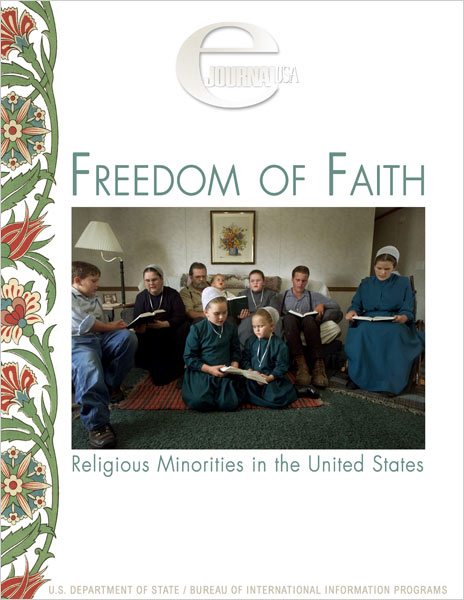
Freedom of Faith
The principle of religious freedom is a cherished right in the United States, one that has historical roots older than the formation of the nation itself. In the 21st century, the United States pulses with a unique cultural chemistry brought on by a wave of immigration which has brought followers of more diverse faiths to many communities. This edition of eJournal USA examines how the nation adjusts to these demographic changes to remain true to the principles of freedom of faith.
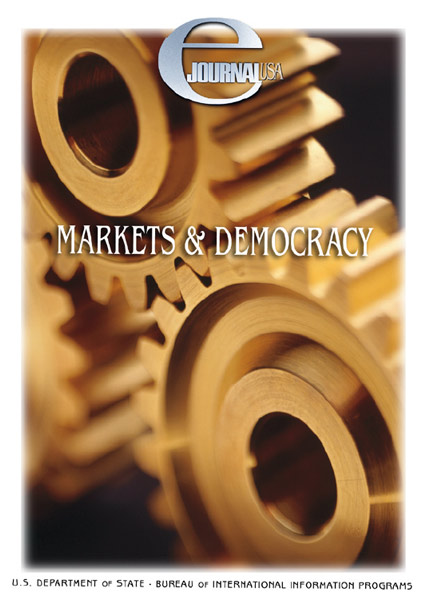
Markets and Democracy
The connection between markets and democracy has never been a straight line. Since the 1700s economic thinkers have been debating this complex relationship. Is it possible to have free markets without democracy? Which develops first? Can the incentive of economic growth lead to greater democracy in countries that are not democratic?
The 12 international experts we’ve assembled in this issue take up different aspects of the conundrum and offer their answers to these questions. Our goal, however, is not to resolve a centuries-old intellectual debate but to deepen our readers’ understanding about the nuances of what is undeniably a matter of importance for everybody in the world today.
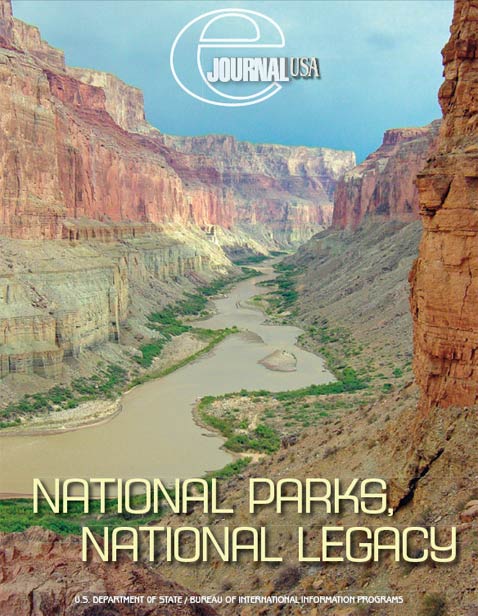
National Parks, National Legacy
The people of the United States own and protect a sprawling system of national parks, including seashores, trails, monuments, and battlefields. All American citizens are, in a sense, stewards of sites where history unfolded, where mountains soar, and where rivers run. They keep these parks for the future, and they treasure them today. As former President Franklin Delano Roosevelt said, “There is nothing so American as our national parks. The scenery and wildlife are native. The fundamental idea behind the parks is native. It is, in brief, that the country belongs to the people.” This edition of eJournalUSA presents glorious views of the national parks, the history of this vast system, and its mission of conservation and public access.
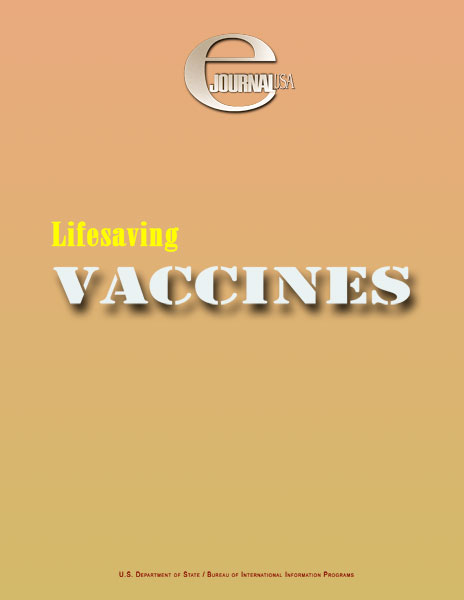
Lifesaving Vaccines
Vaccines can prevent disease, prolong life, and eradicate scourges dating to prehistory. Knowledge of vaccine effectiveness is decades old, but children in developing nations are still dying from vaccine preventable diseases. The United States and international partners have been working together for more than 30 years to expand the benefits of vaccines to children everywhere.
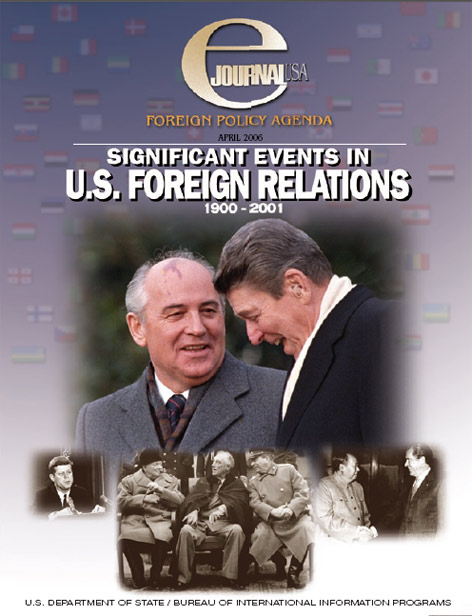
Significant Events in U.S. Foreign Relations 1900-2001
Focusing on a number of seminal world events, this issue of eJournal USA: Foreign Policy Agenda offers a framework for examining how U.S. foreign relations have evolved over the past century, influenced by the legacy of America's founding ideals of protecting individual rights and freedom.
The Editors recognize that any selection of "major events" will ultimately be arbitrary, but it is our hope that those in this journal will provide insight into the American character and stimulate dialogue among international audiences.
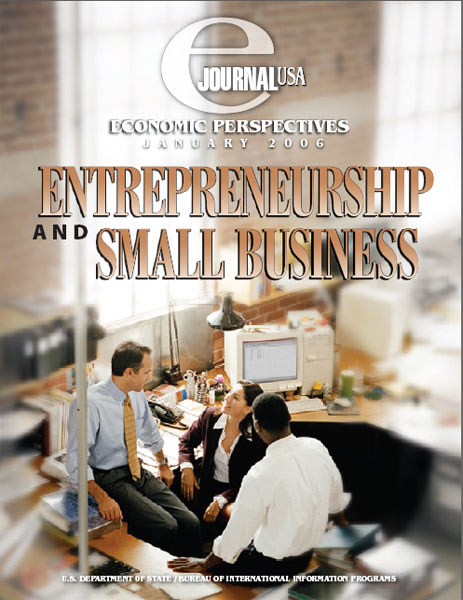
Entrepreneurship and Small Business
Small businesses built the United States in the country's first century. Today the flexibility of small businesses provides lessons for big business. Small businesses contribute to the U.S. economy not only in innovation and adaptability, but also in job creation for women and minorities and in economically distressed areas.
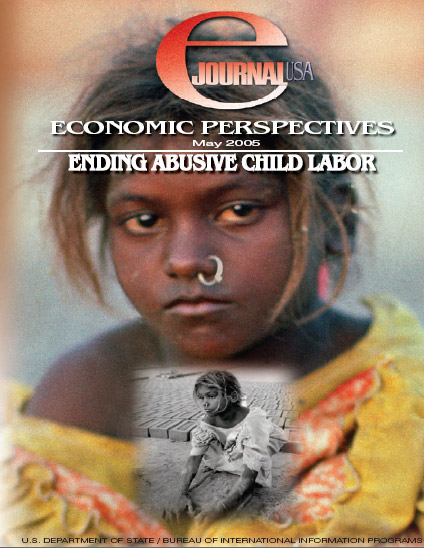
Ending Abusive Child Labor
Creating a safe and healthy world for our children is as important a task as any that exists. Yet millions of children around the world remain victims of poverty, illness, armed conflict, and exploitive and forced labor.
We examine this month some of the noteworthy initiatives under way to combat abusive child labor. We hope that this issue helps our interactive and print audiences to understand more fully the plight faced by the young girl pictured on our cover and the many efforts under way to help her and the many thousands of children in situations like hers around the world.
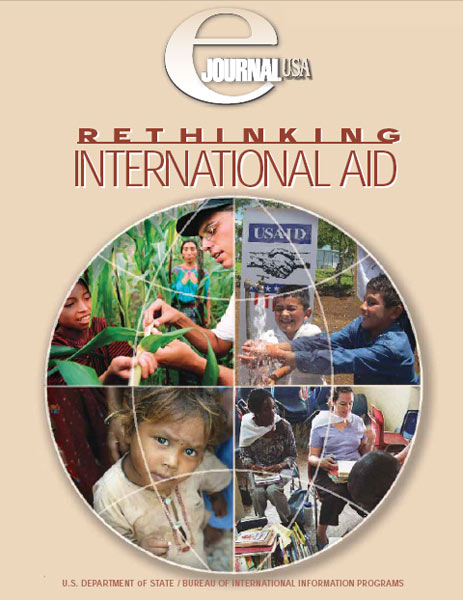
Rethinking International Aid
This edition of eJournal USA describes how U.S. foreign aid — directed through government and faith-based organizations, through individuals, businesses, and a multiplicity of partnerships — has developed, how it fits into foreign affairs, and how it is related to advancing altruistic objectives.
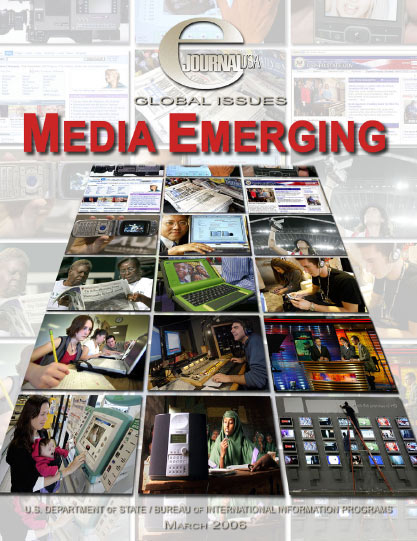
Media Emerging
Innovation in information technologies has thrust the world into an era of democratic media in which people have access to news and information unbound from traditional barriers of time and geography. Innovation gives rise to new media formats with new models for information distribution, consumption, and use. Traditional lines between the audience and media institutions are crossed as citizens gain access to platforms from which to express their own ideas and opinions, circumventing media corporations and governments, the long-standing gatekeepers of information.
Experts and pioneers in these changing technologies share their thoughts on the following pages, describing the innovations unfolding and offering a vision of what may lie ahead.
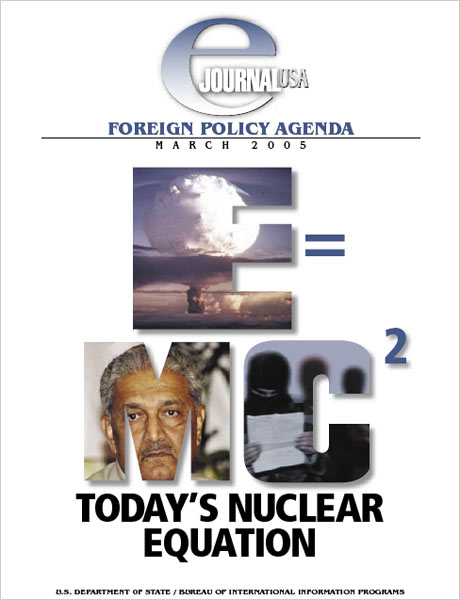
Today's Nuclear Equation
While that Cold War threat of nuclear annihilation has receded, this edition of Foreign Policy Agenda examines the elements in today's nuclear equation. Instead of superpowers facing off, we encounter rogue states, stateless terrorist organizations bent on acquiring the means of mass murder, and black-market networks of renegade suppliers (like Pakistani nuclear scientist A.Q. Khan pictured on the cover) willing to deal in the materials and technical expertise that lead to nuclear weapons. The ensuing nightmare could materialize quite unexpectedly in any large city.
This electronic journal, "Today's Nuclear Equation," offers the U.S. position on critical treaty-related issues as well as a range of expert opinion on the thorniest current issues in nuclear nonproliferation.
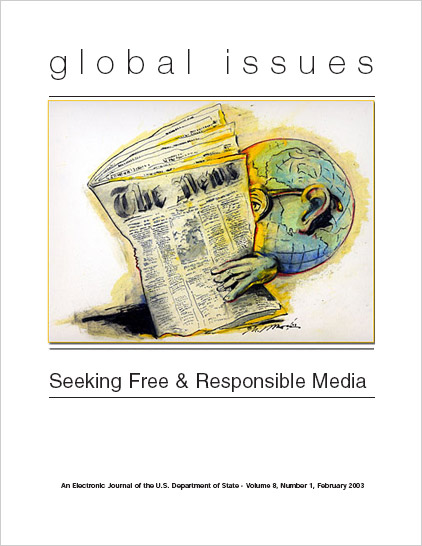
Seeking Free and Responsible Media
It has long been the policy of the U.S. government to support the development of open and responsible media abroad and to assist in building the infrastructure needed for a free press to operate -- legislative infrastructure, financial independence, transparency in government, and journalists trained in objective and fair reporting. Achieving a free and responsible media is a constant, challenging, vital, and ongoing activity. We must continue to work at it, adapting to new conditions and challenges. We must keep in sight the ultimate objective -- a citizenry able to make informed decisions that shape their lives.
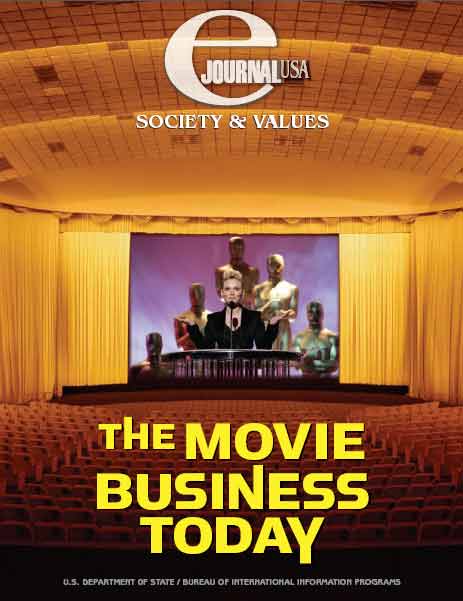
The Movie Business Today
This issue of eJournal USA analyzes the increasing internationalization of the film industry, both in terms of audiences and filmmaking talent; the rise of a more personal style of independent filmmaking in recent years; the market for foreign-produced films in the United States; and the effects of the Internet and the digital revolution on how movies get made and distributed. Shorter pieces focus on film festivals like Sundance that seed young talent and some film studios' efforts to go green in making movies.
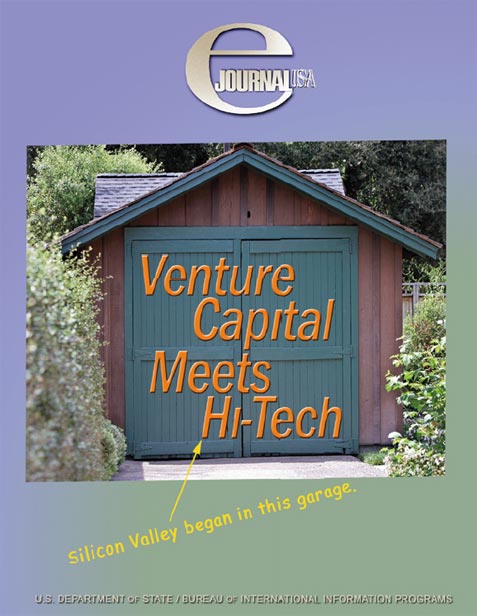
Venture Capital Meets Hi-Tech
This eJournal explores the phenomenon that drives uncounted Americans — and now citizens of other nations — to create fledgling “start-up” businesses that explore and exploit the latest developments in high technology. It also investigates the closely related “venture capital” phenomenon. How investors match their funds to (hopefully) winning ideas is a big part of the start-up story.
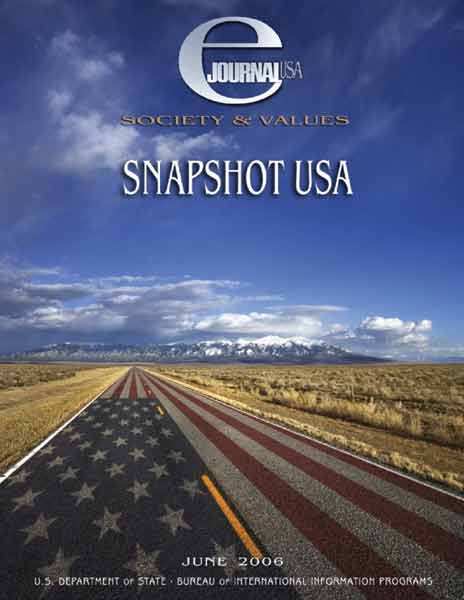
Snapshot USA
This edition of eJournal USA is designed to provide a central resource for information about the United States. It is but an introduction, tailored to the current generation of young people around the world, containing many facts and statistics, but also essays which describe a little of how Americans think about their country and the world.
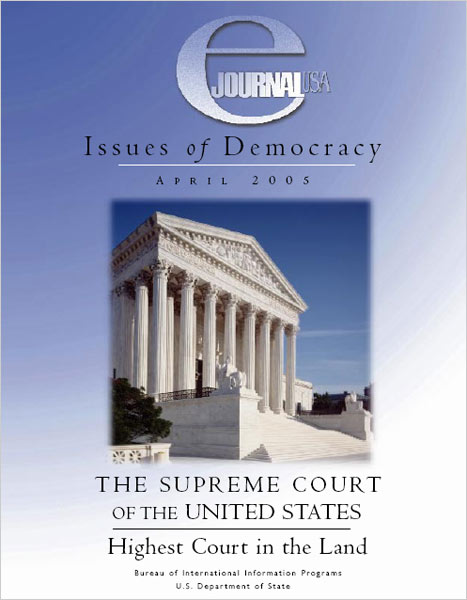
The Supreme Court and the United States
The ultimate interpreter of American law and the American Constitution itself is the United States Supreme Court. Nearly 220 years old, the Court has grown dramatically in stature and authority. Its authority to invalidate as unconstitutional actions of the legislative and executive branches now is long settled. Americans may disagree with the Court's decisions, but defying the Court is simply beyond the bounds of political, even social, legitimacy.
We present a collection of essays in this journal that explain how the Court functions. They also illustrate how it commands the respect of Americans and plays a vital role in the constitutional system.
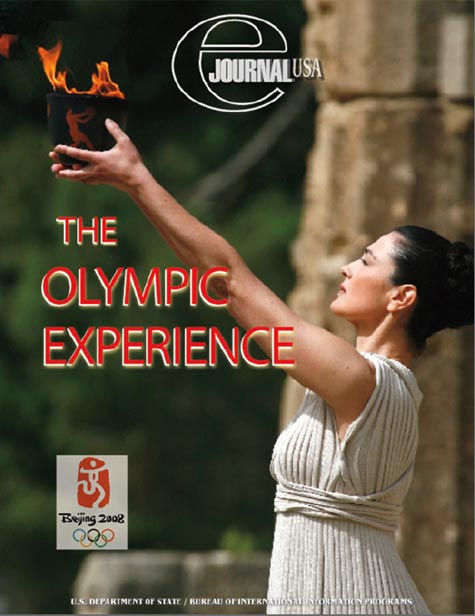
The Olympic Experience
The Olympic Games remind us of certain universal human values. Every Olympian has a story that echoes the shared human struggle for excellence and our devotion to pursue purpose in life. In this issue of eJournal USA, we celebrate the Olympics through the individual experiences and insights of athletes who share their memories of the Olympic Experience.
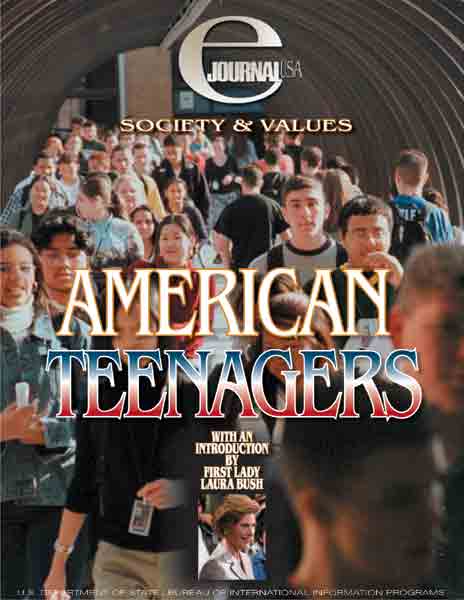
American Teenagers
What do American teenagers have to say about their lives, values, hopes and dreams? The essays and reflections in this e-journal give a glimpse into some of the many ways a teenager's day might unfold in the United States, as well as an insight into his or her goals, ambitions, and concerns.

Sharing Science: Global Partnerships
This edition of eJournal USA focuses on science as an inherently international undertaking in which researchers share the results of their work with a scientific community that spans the planet, through a growing array of collaborative efforts, technical journals, conferences, the Internet, and dedicated high-bandwidth data networks for research and education. The eJournal has many examples of U.S. participation and leadership in these international undertakings.
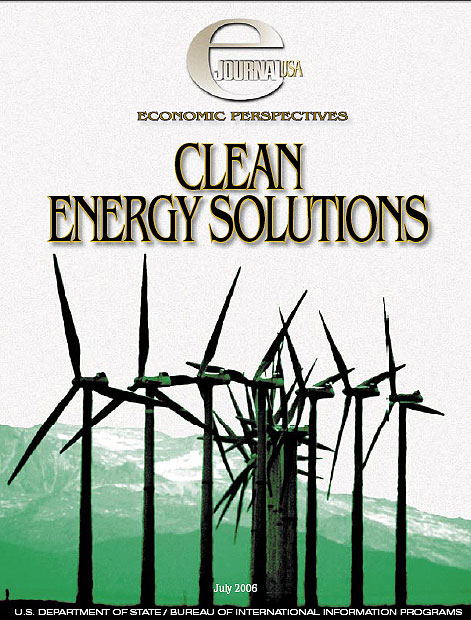
Clean Energy Solutions
Projected dramatic increases in energy consumption in the coming decades, combined with a higher risk of climate change, require a massive global response based on technological innovation and the power of the marketplace. Experts and government officials describe the options before us, including renewable energy, novel vehicles, and low-carbon power generation, and discuss the best ways leading to a sustainable energy future.
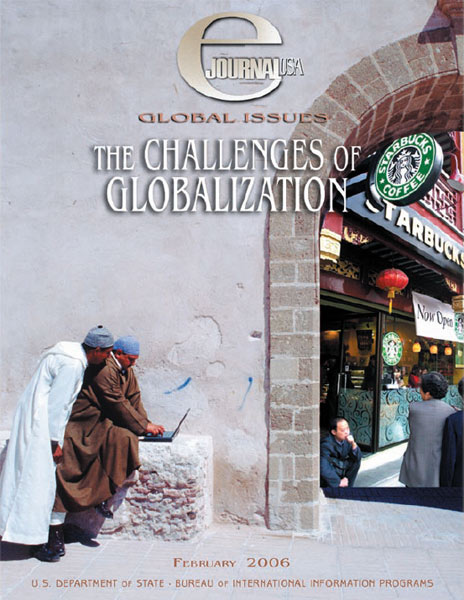
The Challenges of Globalization
The World Bank defines globalization as "the growing integration of economies and societies around the world." Wikipedia, the Internet encyclopedia, describes globalization as "the changes in societies and the world economy that result from dramatically increased international trade and cultural exchange." The British magazine The Economist recently likened globalization to a line from a John Lennon song, "Imagine there's no countries. It isn't hard to do." Clearly, globalization means different things to different people.
In this issue we consider these and other aspects of globalization. The experts we have chosen examine the topic from a variety of angles, yet we offer no prescriptions, no definitive answers: Our goal is for our readers to come away with a better understanding of a deep-seated, complex phenomenon that affects us all.
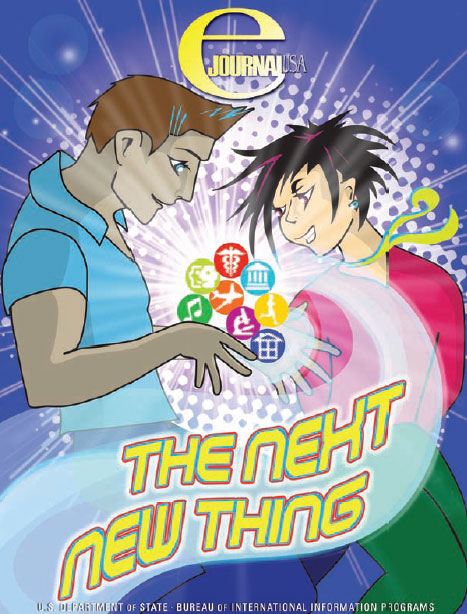
The Next New Thing
Innovation is the art of creating something new, and everyday in the U.S. and around the world, scientists, students, and everyday people are working to bring to life an idea that is theirs alone. This edition of eJournal USA tells the story of innovators and their creations.
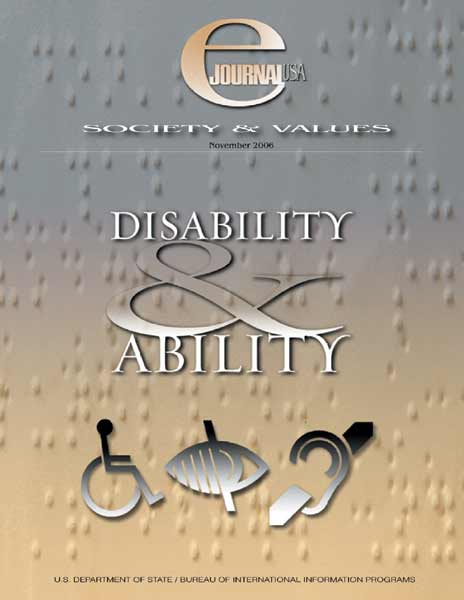
Disability and Ability
With support, people can overcome even severe disabilities while maximizing their abilities and lead fulfilling and productive lives. We hope you will enjoy reading about the Americans with Disabilities law and about the programs underway to help turn disabilities into abilities, from accommodation to technology and medical research. Opening opportunities and removing barriers to people with disabilities is a work in progress, but the results can be truly inspiring.
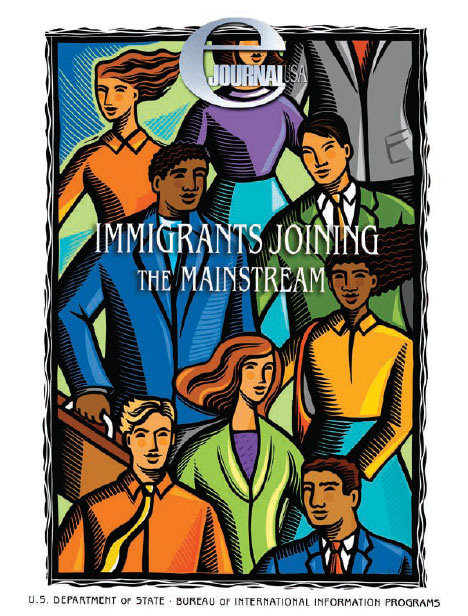
Immigrants Joining the Mainstream
Immigrants made the United States what it is. Being an American depends on acceptance of certain American ideals, not on the place of birth of a person or of his or her ancestors. This edition of eJournal USA tells the story of immigration and diversity as it has played out through the centuries and continues to play out now.
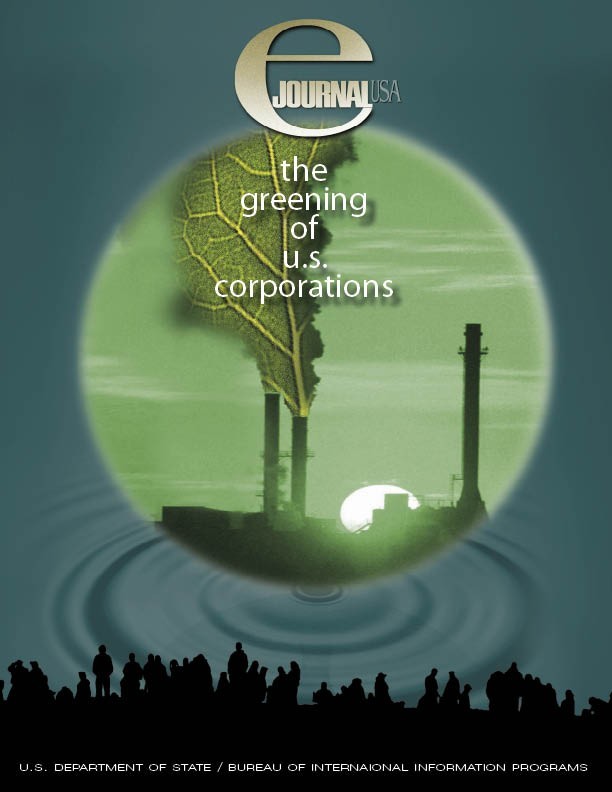
The Greening of U.S. Corporations
This issue of eJournal USA delves into what those familiar with the history of the environmental movement in the United States might see as a surprising trend — the way U.S. corporations in recent years have embraced environmentally friendly ways of doing business. What prompts a corporation to “go green”?
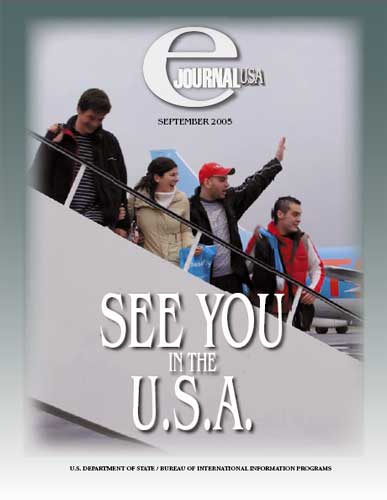
See You in the U.S.A.
This eJournal USA brings together the information you need to make your trip to the United States as easy as possible. It also defines the acronyms of U.S. government travel programs and explains how these fit in with those of other nations.
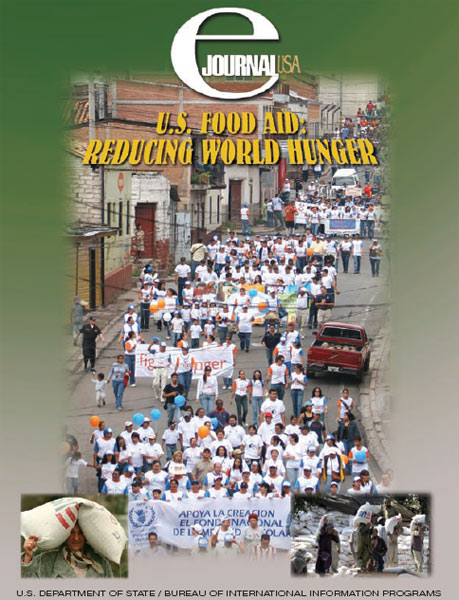
U.S. Food Aid Reducing World Hunger
It is estimated that some 850 million people around the world suffer from hunger and malnutrition. Through articles written by NGO representatives and U.S. government officials, this edition of eJournal USA describes some of the ways in which the United States government works through its agencies and in conjunction with international organizations and NGOs to provide food and assistance to save lives and to help hungry people feed themselves.
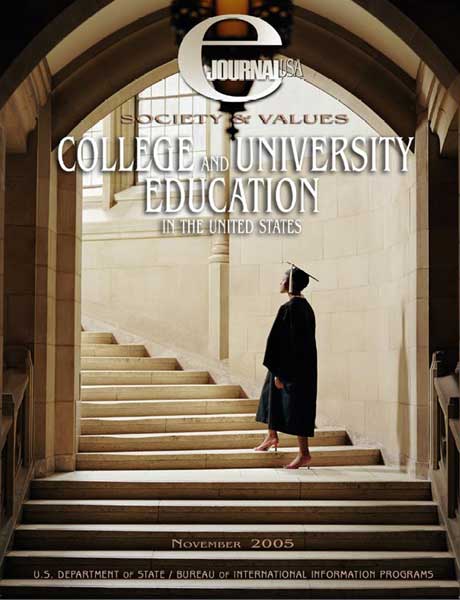
College and University Education in the United States
From the many types of institutions to the virtually unlimited array of programs and majors, the universities and colleges in the United States reflect the diversity, tolerance, and pursuit of excellence that characterize the best of the country as a whole. Through this journal, prospective international students and their parents and advisors will learn about the American system of higher education and academic and student life at U.S. colleges and universities.

World Youth: Building a Future
This eJournal opens a window on the real life experiences of young people who have left home and family to participate in an international exchange program. Young American adults offer first-person accounts of their discoveries in educational programs abroad, and exchange students from various other countries share their insights about adjusting to life and family customs in the United States.
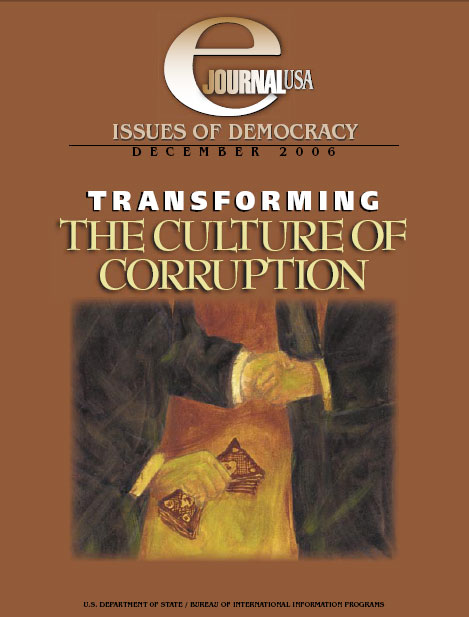
Transforming the Culture of Corruption
In recent years, through a series of international agreements, a global framework for combating corruption has begun to emerge. Individual countries can now make their anticorruption efforts more effective by vigorously implementing anticorruption commitments and relying on international cooperation. This issue of eJournal USA highlights the important roles that the public sector, private sector, and non-governmental organizations play in eradicating corruption worldwide.
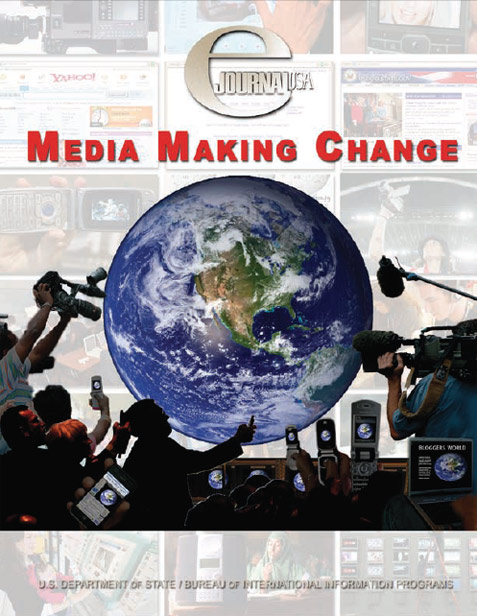
Media Making Change
New media technologies give average citizens access to vast amounts of information and broad networks of people. People can use these tools to pursue social and political agendas of their own making. This edition of eJournal USA shows how this new empowerment is influencing nations in various parts of the world.
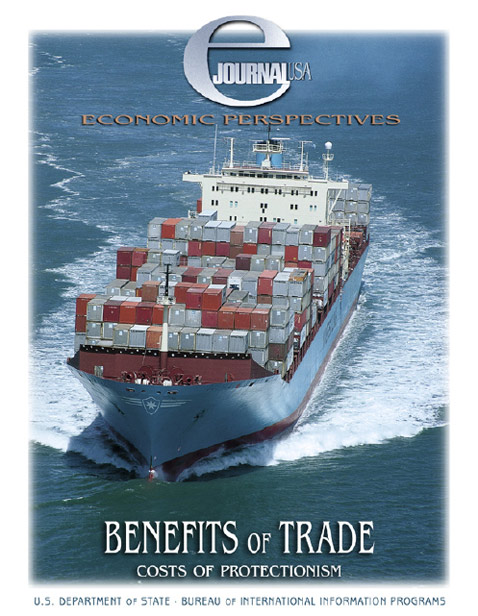
Benefits of Trade Costs of Protectionism
Removing trade barriers through World Trade Organization and other negotiations promises to lift millions of people around the world out of poverty. Maintaining protectionist practices hurts millions, especially in the developing world, by preventing sustained economic expansion. While developed countries need to drop their own protectionist practices, developing countries stand to gain the most benefits by removing their protectionist barriers to imports from each other. Protectionism bolsters the politically designated few while harming the many; the problem and the solution are political. This issue of eJournal USA has articles from authors inside and outside the U.S. government describing the benefits of trade and the costs of protectionism.
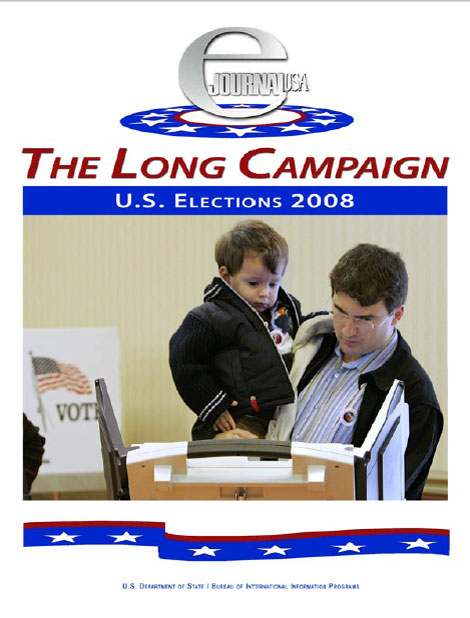
The Long Campaign: U.S. Elections 2008
This edition of eJournal USA presents an introduction to the upcoming 2008 U.S. elections. In these elections, U.S. voters will have the opportunity to vote for president and vice president, congressional representatives, state and local officials, and ballot initiatives. The journal describes aspects of this election which make it different from most recent elections and includes a pro-con debate of the Electoral College.
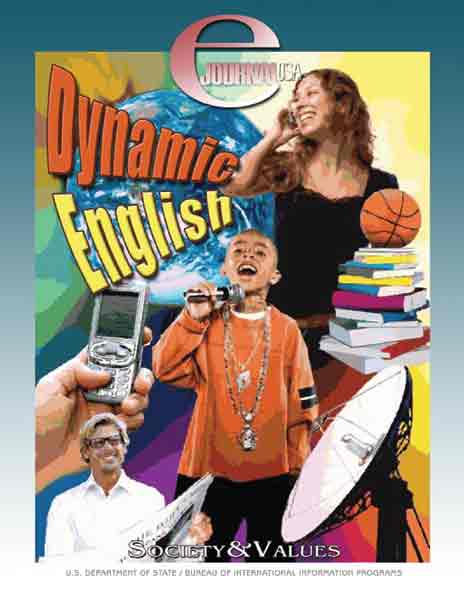
Dynamic English
This edition of eJournal USA discusses forces that shape and change everyday English. From cultural and international influences, such as words that come directly, or in a changed form from another language, to popular media, including movies, music and sports, to changes arising from technological developments, the authors present examples of ways English changes daily. Other articles describe the process of language change, and tips for deciphering slang.
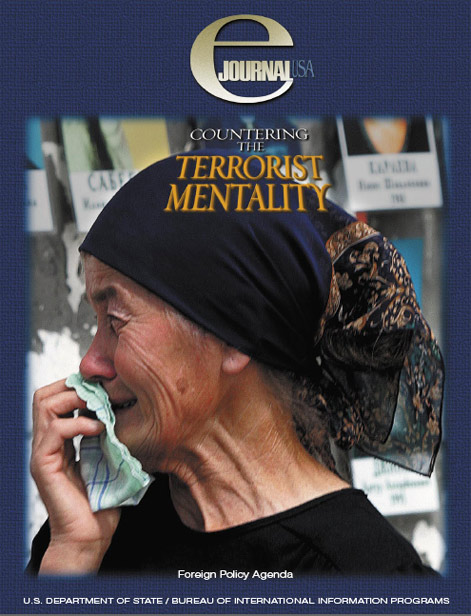
Countering the Terrorist Mentality
This edition of eJournal USA, "Countering the Terrorist Mentality," provides a look at the complex, global problem of terrorism. Several of the world’s leading scholars in this field, including Walter Laqueur, Bruce Hoffman, Jerrold Post, David Kilcullen, Mohammed Hafez, and Mia Bloom, examine the motivations of those who carry out terrorist attacks and the techniques terrorist organizations like al-Qaida use to recruit and motivate them.
-

Energy Efficiency: The First Fuel April 2009
-

Nonviolent Paths to Social Change March 2009
-

Multicultural Literature February 2009
-

The 2009 U.S. Presidential Inauguration January 2009
-

U.S. Presidential Transitions January 2009
-

Choosing a Career December 2008
-

The Candidates October 2008
-

The Electoral College September 2008
-

The Long Campaign October 2007
-

The Supreme Court and the United States April 2005
-

Freedom of Faith August 2008
-

National Parks, National Legacy July 2008
-

The Olympic Experience April 2008
-

Immigrants Joining the Mainstream February 2008
-

The Next New Thing January 2008
-

Dynamic English August 2007
-

World Youth Building a Future July 2007
-

The Movie Business Today June 2007
-

Disability and Ability November 2006
-

Snapshot USA June 2006
-

College and University Education November 2005
-

See You in the U.S.A. September 2005
-

American Teenagers July 2005
-

Venture Capital Meets High-Tech May 2008
-

Benefits of Trade Costs of Protectionism January 2007
-

Entrepreneurship and Small Business January 2006
-

The Universal Declaration of Human Rights November 2008
-

Markets and Democracy June 2008
-

The Greening of U.S. Corporations March 2008
-

Media Making Change December 2007
-

Rethinking International Aid November 2007
-

U.S. Food Aid Reducing World Hunger September 2007
-

Lifesaving Vaccines March 2007
-

Transforming the Culture of Corruption December 2006
-

Sharing Science: Global Partnerships October 2006
-

Clean Energy Solutions July 2006
-

Media Emerging March 2006
-

Ending Abusive Child Labor May 2005
-

Seeking Free and Responsible Media February 2003
-

Countering the Terrorist Mentality May 2007
-

Events in U.S. Foreign Relations April 2006
-

The Challenges of Globalization February 2006
-

Today's Nuclear Equation March 2005
- Home
- American Life
- Economy
- Global Challenges
- International Relations
- World Regions
- Multimedia
- Publications
This site delivers information about current U.S. foreign policy and about American life and culture. It is produced by the U.S. Department of State's Bureau of International Information Programs. Links to other Internet sites should not be construed as an endorsement of the views contained therein.
- Services:
- Email Updates
- RSS Feeds
- Mobile
- Weekly Newsletter
- Multimedia:
- Webchats & Webcasts
- Blogs
- Photo Gallery
- Podcasts
- Video
- Publications:
- eJournal USA
- Books
- Student Corner
